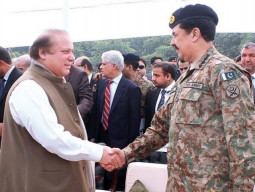
Five days of debate in Pakistan’s parliament is all it took to unravel 50 years of a natural alliance based on trust, history and mutual interest. The archives of the Saudi foreign service hide an interesting anecdote that dates back to 1954. After arriving in Karachi, then Pakistan’s federal capital, King Saud bin Abdul Aziz Al Saud, the second king of Saudi Arabia, noticed his official car was not moving. “What is the delay?” he asked his Saudi aide. It transpired that Pakistani protocol officers were waiting for the Saudi flag to be placed on the car’s front. “Why? Is not the Pakistani flag there? That is enough. That is our flag too.” The car moved without a Saudi flag.
The current impasse in Pakistan’s relationship with Saudi Arabia and most of the Gulf is not about Yemen, or about sending troops. It is about trust. Pakistan has a sovereign right to decide its military engagement in a war abroad. No one questions that. However, our choice of how we communicated our intentions led to an unnecessary diplomatic crisis that will reverberate for a long time to come. The method we adopted was crude, cold, and badly mishandled.
In the name of discussing Yemen, the Pakistani capital witnessed a systematic and organised humiliation of Saudi Arabia for a week. After a half-century of oil boom, Gulf Arabs today are educated, driven and have the most robust print, electronic and social media footprint in the Middle East. While Pakistani media is absent in Arab capitals, Gulf’s media has a lively presence in Islamabad. Our friends and allies in the Gulf closely watched what happened here during April 6-10, and they did not expect it, not from Pakistan.
We might comfort ourselves by saying the debate was a democratic exercise in neutrality. However, this is how it appeared in the Gulf: for an entire week, Pakistani politicians ridiculed the Saudis, called them names, accused them of aggression, questioned Riyadh’s intentions, and all but held the Saudis responsible for every ill in the Middle East. It was a diplomatic fiasco. I cannot recall the last time parliament in Iran, a country engaged in a regional cold war with the Saudis, indulged in crude Saudi-bashing like we did. In short, Saudi Arabia was on trial in Islamabad. You do not behave like this with friends in your personal life, let alone between nations at crucial times.
How many times have Pakistani parliamentarians bashed India like this? Never. In fact, the Indian prime minister took a swipe at Pakistan in the middle of our Saudi-bash fest, on April 8, accusing us of fostering a “violent environment” that made peace talks impossible. He lied. Yet not a single member of parliament rebuffed the Indian premier. When the Gulf Arabs began to get over the initial shock, Pakistani media created another hype by picking up one line from five tweets made by a UAE minister of state, taking his words out of context, and creating a warlike situation with one of our closest allies. I know some of our politicians, who would never be caught criticising India, taking on Riyadh like it was the enemy.
In the UAE, more government officials are on Twitter than in Islamabad. Taken together, the UAE minister’s tweets reflected angst and disappointment by a friend in distress. It was an early sign that our parliament’s message and its wording sent the wrong signal, that Islamabad failed to appreciate the sense of insecurity currently prevalent in the Gulf, where the people see wars in Yemen and Iraq as attempts of Iranian encirclement and a prelude to chaos in the Gulf similar to Libya and Syria. The point is that if we planned to destroy five decades of a special relationship with some of our closest allies, we have almost succeeded. This relationship had many enemies. Instead of containing any misunderstandings, we allowed them to get out of control.
I monitored the reactions in the Gulf media. Two days before Prime Minister Nawaz Sharif’s April 13 statement, I used the ‘shoulder to shoulder’ analogy in an Arabic-language segment on my Express News political commentary show “@Q”. It went viral on Gulf media. The story was published in newspapers, and the segment was telecast in Saudi Arabia’s top political talk show hosted by veteran journalist Dawood Al-Sherian on al-Arabiya. In four days, the video had 130,000 hits from the Gulf, Jordan and Egypt. Almost unanimously, they thanked all Pakistanis and me but said they no longer trusted Pakistan’s government. What to do now?
On Yemen, the Pakistani interest is firmly aligned with Saudi Arabia and the Gulf. This is in the interest of all Pakistanis, regardless of political affiliations. Iran’s involvement in the Yemen conflict does not make it sectarian. In fact, invoking sectarianism in our debate on Yemen is tantamount to blackmailing Pakistan on a very important strategic issue. Millions of Pakistanis, regardless of politics, sect and religion have a direct economic interest in a strong, robust relationship with Saudi Arabia and the Gulf. Moreover, two Shia leaders, the King of Morocco and the president of Azerbaijan, support the Saudi position on Yemen. There is nothing sectarian about this strategic conflict.
We cannot support Iran’s position on the Houthis. Our friends in Tehran understand this and accept it. This will not harm our relationship. Tehran did not support Pakistan’s position in Afghanistan in the 1990s due to its own strategic calculus. We respect that. As friends and neighbours, we work together on some issues and disagree respectfully on others. Now, the UN Security Council resolution under Chapter VII, with the support of P-5, including Russia, gives legal cover to Operation Decisive Storm. It is a moral and a political victory for the Saudis. Pakistan should extend unlimited support to this operation. Also, the Gulf Arabs see the operation as an indigenous Arab and Muslim military solution after long enduring foreign military interventions in the region. It has become a matter of pride and destiny.
The Saudis are disturbed because of conflict on two fronts: Yemen and Iraq. This is the time to show support to an ally. Ideas such as mediation and neutrality make no sense. The Houthis are outlaws who rebelled against a legal government. As the Saudi ambassador to Washington announced on April 16, the Houthis are Yemeni citizens and are welcome to participate in the political process, but cannot seize power or act as proxies of Iran in the Saudi backyard. This is a fair objective of the operation and is similar to our own action against the TTP and BLA terror groups. While our role will be limited in the Saudi-led coalition due to our strategic constraints, we can help the Gulf states by assisting them in securing the Saudi-Yemen border, and securing the oil facilities so that Saudi forces can focus directly on operations in Yemen. For the people in the Gulf, this is an existential war. Gulf citizens and Arabs will remember our policy choices now for a long time to come.
Published in The Express Tribune, April 18th, 2015.
Like Opinion & Editorial on Facebook, follow @ETOpEd on Twitter to receive all updates on all our daily pieces.





















































COMMENTS (44)
Comments are moderated and generally will be posted if they are on-topic and not abusive.
For more information, please see our Comments FAQ